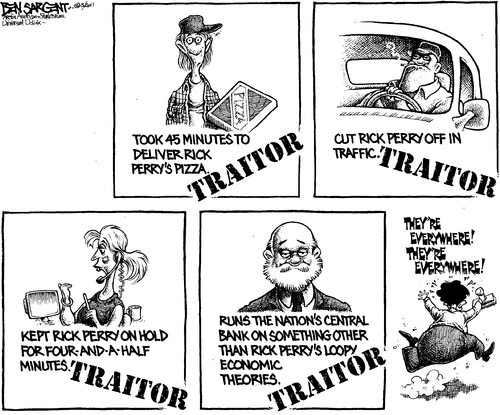Down, down, down. Would the fall never come to an end! `I wonder how many miles I’ve fallen by this time?’ she said aloud. `I must be getting somewhere near the centre of the earth. Let me see: that would be four thousand miles down, I think–‘ (for, you see, Alice had learnt several things of this sort in her lessons in the schoolroom, and though this was not a very good opportunity for showing off her knowledge, as there was no one to listen to her, still it was good practice to say it over) `–yes, that’s about the right distance–but then I wonder what Latitude or Longitude I’ve got to?’ (Alice had no idea what Latitude was, or Longitude either, but thought they were nice grand words to say.)
US STOCKS-Wall St slides for fourth straight week
By Ashley Lau, Reuters
Fri Aug 19, 2011 4:39pm EDT
NEW YORK, Aug 19 (Reuters) – Wall Street ended a fourth week of losses on a down note on Friday as most buyers left the market before the weekend on growing fears of another U.S. recession and destabilization in Europe’s financial system.
Could it be because our policy makers in Washington have no idea what Latitude is, or Longitude either, but think they are nice grand words to say?
How Austerity Is Ushering in a Global Recession
Robert Reich
Tuesday, August 16, 2011
Not only is the United States slouching toward a double dip, but so is Europe. New data out today show even Europe’s strongest core economies – Germany, France, and the Netherlands – slowing to a crawl.
We’re on the cusp of a global recession.
Policy makers be warned: Austerity is the wrong medicine.
…
(C)halk up a big part of Europe’s slowdown to the politics and economics of austerity. Europe – including Britain – have turned John Maynard Keynes on his head. They’ve been cutting public spending just when they should be spending more to counteract slowing private spending.The United States has been moving in the same bizarre direction. Cutbacks by state and local governments have all but negated the federal government’s original stimulus, and no one in Washington is talking seriously about a second. The pitiful showdown over increasing the debt limit has produced the opposite: a Rube-Goldberg-like process for capping spending rather than increasing it, and a public that’s being sold the Republican lie that less government spending means more jobs.
…
With anemic growth in America and Europe, the Japanese economy comatose, and emerging markets (including China) pulling in their reins, the vicious cycle could become worldwide. If global demand for goods and services continues to fall behind the potential supply we’ll see unemployment rise further and growth slow even more – especially in Europe and the U.S.
…
Without an expansionary fiscal policy, low interest rates have little effect. Companies won’t borrow in order to expand and hire more workers unless they have reasonable certainty they’ll have customers for what they produce. And consumers won’t borrow money to spend on goods and services unless they’re reasonably confident they’ll have jobs.Fiscal austerity is the wrong medicine at the wrong time.


 The rectangular two-and-a-half-mile track linked four turns, each exactly 440 yards from start to finish, by two long and two short straight sections. In that first five-mile race on August 19, 1909, 12,000 spectators watched Austrian engineer Louis Schwitzer win with an average speed of 57.4 miles per hour. The track’s surface of crushed rock and tar proved a disaster, breaking up in a number of places and causing the deaths of two drivers, two mechanics and two spectators.
The rectangular two-and-a-half-mile track linked four turns, each exactly 440 yards from start to finish, by two long and two short straight sections. In that first five-mile race on August 19, 1909, 12,000 spectators watched Austrian engineer Louis Schwitzer win with an average speed of 57.4 miles per hour. The track’s surface of crushed rock and tar proved a disaster, breaking up in a number of places and causing the deaths of two drivers, two mechanics and two spectators.
Recent Comments